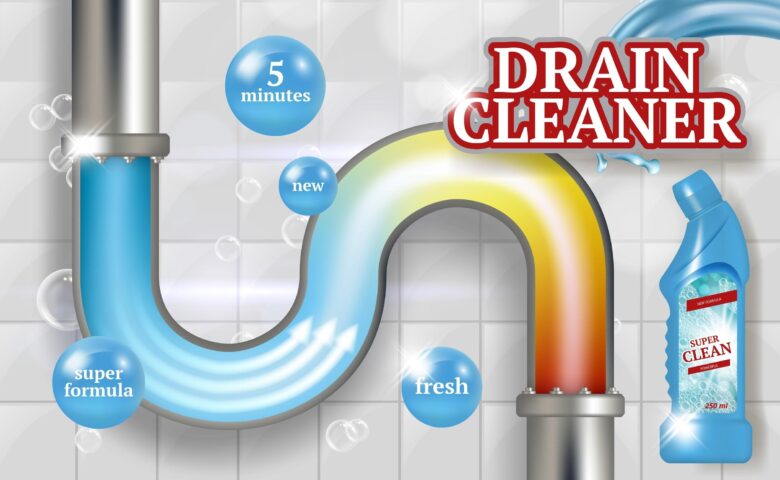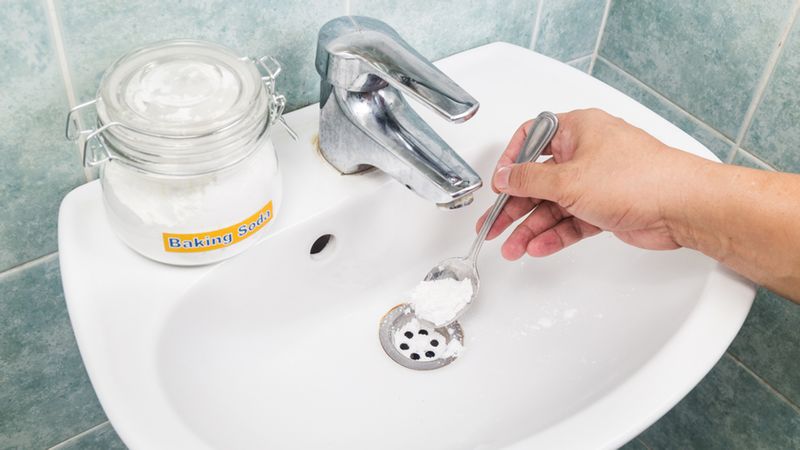“Not again!” That’s the normal (and understandable) reaction when you encounter a slow or clogged drain in your home. Whether it’s a bathroom sink or tub drain that’s backed up with water, the most likely culprit is a blockage in the trap. This is the U-shaped part of the drainpipe that prevents sewer gases from coming back up through the plumbing. But it’s also a great place for hair, soap, and dirt to clump together and muck up the works.
If you are feeling handy and are comfortable working with minor plumbing issues, opening the P-trap can be the first thing to try in order to find and clear the blockage. Take special notice of how you take this apart and how tight the connections are. You’ll want to replace everything the way you found it.
Place a bucket under that part of the plumbing. Keep in mind that this might get messy, so dress accordingly. Loosen the P-trap slowly and see if that is the location of the clog. If the focus of the problem is not there, then the rest of this blog is definitely for you!
While the goal is to clear to the clog as soon as possible, we urge you to avoid the “quick fix” of a chemical drain cleaner. In this article, Liberty Plumbing, Heating & Air Conditioning, Inc. explained why and then give you some reliable natural approaches.
Why you should avoid chemical drain cleaners
Liquid drain cleaners that you can find in stores – like ones that start with the letter D and rhyme with “lame-o” – use harsh (even toxic) chemicals. Sure, they can be effective at some – but not all types of clogs – but they can also do a number on your plumbing, personal health, and the environment.
The principal ingredient in most of these chemical drain cleaners is hydrochloric acid, sodium hydroxide, lye, or something else equally as nasty. As you can imagine, prolonged use of any of these caustic ingredients may provide a temporary fix for your clog, but it also may leave behind permanent damage to your plumbing system.
In our opinion, they’re not worth your money. You can resolve most clogs with a few easy tricks.
Natural ways to unclog a drain

source:today.com
- Zip-It tool – In many cases, if you can remove the hairball from the trap, that will take care of your clog situation. A Zip-It is a simple, inexpensive tool that you can find at most home improvement stores. It has small barbs that can grab on to hair. Simply insert and push the tool down the drain, wiggle it around, then pull it back up. Once you throw away whatever tangled mess you bring up, run some warm water and see if it drains correctly.
- Baking soda and vinegar. This one may remind you of the science class. First, pour one cup of baking soda down the stubborn drain. Next, add one cup of vinegar. The fizz will expand and hopefully loosen up the clog in the trap. Give it about five minutes to work its magic, then pour hot (but not boiling water) down the drain to flush it out.
- Baking soda and salt. If the first mixture doesn’t do the trick, try this one. Put a cup of baking soda and a half cup of salt down the drain, then let it sit overnight. Again, we’re hoping to dissolve the blockage just enough that it can pass through the trap. The next day, run hot water down the drain.
- Drain catcher – As they say, an ounce of prevention is worth a pound of cure. A simple drain catcher can prevent hair and large objects from going down the drain and cause a clog. It might be too late to fix a current blockage but this can help prevent the next one from happening.
- Garbage Disposal – I know this seems a bit obvious, but make sure your garbage disposal isn’t clogged. Something as simple as that can block your drain and keep water from flowing correctly.
- Plunger – Every home should have a plunger. It is usually a short term fix of a bigger problem, but it can buy you time to schedule a plumber.

source:wikihow.com
Common Causes of Sink Clogs
- One of the most common causes of sink blockages are the most natural of all. The beauty of trees in our yard can also present the danger of roots growing into our pipes.
- Grease and other natural cooking by-products can collect in our kitchen sink and form quite a clog. Take extra care on what you choose to put down your sink.
- Soap provides wonderful suds to use for everything from your morning shower, laundry chore, and sparkling dishes. Unfortunately, it can also leave behind residue that can build up over time, mix with any other residue in the pipes and form a clog.
- Flushable wipes should never be flushed. They are one of the biggest causes of clogs in toilets. We never recommend putting these products into your plumbing system.
Knowing what may have caused the clog, may help you avoid another one in the future.

source:wikihow.com
When it’s time for a professional drain cleaning
If none of these tips get your drain flowing properly, it’s probably time to call in a plumber. Serious clogs can require professional-grade tools to reach. Also, it may not actually be a typical clog but a more serious plumbing issue like a corroded pipe, a tree root growing into the pipe, or even a sewer line blockage.
We often forget the importance running water plays in our lives, until a clog suddenly appears. Then our ability to have this convenience comes to a standstill, while we wait for the problem to be resolved.
Your home’s plumbing system is nothing to take for granted. A professional plumber can diagnose and propose the most efficient course of action to take in order to return your pipes to optimal efficiency for you and your family.

